- Home
- Clarice Lispector
The Passion According to G.H. Page 6
The Passion According to G.H. Read online
Page 6
In the collapse, tons fell upon tons. And when I, G. H. even on my suitcases, I, one of the people, opened my eyes, I was — not atop debris, for even the debris had already been swallowed by the sands — I was on a calm plain, kilometers and kilometers below what had been a great city. Things had gone back to being what they were.
The world had reclaimed its own reality, and, as after a catastrophe, my civilization had ended: I was nothing more than a historical fact. Everything in me had been reclaimed by the beginning of time and by my own beginning. I had moved onto the first foreground, I was in the silence of the winds and in the age of tin and copper — in the first age of life.
— Listen, faced with the living cockroach, the worst discovery was that the world is not human, and that we are not human.
No, don’t get scared! certainly what had saved me until that moment from the sentimentalized life from which I’d been living, is that the inhuman part is the best part of us, it’s the thing, the thing-part of us. That’s the only reason that, as a false person, I had never before burrowed beneath the sentimental and utilitarian construction: my human feelings were utilitarian, but I hadn’t burrowed under because the thing-part, matter of the God, was too powerful and was waiting to reclaim me. The great neutral punishment of general life is that it can suddenly undermine a single life; if it isn’t given its own power, then it bursts as a dam bursts — and arrives pure, unadulterated: purely neutral. That was the great danger: when that neutral part of things doesn’t sate a personal life, life arrives purely neutral.
But why exactly in me had the first silence suddenly reappeared? As if a calm woman had simply been called and calmly set aside her embroidery on a chair, stood up, and wordlessly — abandoning her life, renouncing embroidery, love and an already-made soul — wordlessly that woman composedly got down on all fours, started to crawl and drag herself along with calm and sparkling eyes: because the earlier life had called her and she went.
But why me? But why not me. If it hadn’t been me, I wouldn’t know, and since it was me, I knew — that’s all. What was it that called me: madness or reality?
Life was taking revenge on me, and its revenge was no more than coming back, nothing more. In every case of madness something came back. The possessed are not possessed by what is coming but by what is coming back. Sometimes life comes back. If everything broke in me as the force passed through, that’s not because its function is to break: it just finally needed to come through since it had already become too copious to be contained or diverted — along its way it buried everything. And afterward, as after a flood, floating upon the waters was a wardrobe, a person, a stray window, three suitcases. And that seemed like hell to me, that destruction of layers and layers of human archeology.
Hell, because the world held no more human meaning for me, and man no longer had human meaning for me. And without that humanization and without the sentimentalization of the world — I am terrified.
Without a cry I looked at the roach.
Seen up close, a roach is an object of great luxury. A bride in black jewels. It is rare, it seems to be one-of-a-kind. In trapping it halfway down its body with the wardrobe door, I had isolated the only known specimen. Only half of its body was visible. The rest, which couldn’t be seen, could be huge, and was divided among thousands of houses, behind things and wardrobes. Yet I didn’t want the part allotted me. Behind the surface of houses — those murky jewels crawling along?
I was feeling unclean as the Bible speaks of the unclean. Why was the Bible so concerned with the unclean, and made a list of unclean and forbidden animals? why, if those animals, just like the rest, had been created too? And why was the unclean forbidden? I had committed the forbidden act of touching the unclean.
I had committed the forbidden act of touching the unclean.
And so unclean was I, in that my sudden indirect knowledge of myself, that I opened my mouth to ask for help. They say everything, in the Bible, they say everything — but if I understand what they say, they themselves will call me mad. People just like me have said it, yet to understand them would be my downfall.
“But thou shalt not eat of the impure: which are the eagle, and the griffin, and the falcon.” And neither the owl, nor the swan, nor the bat, nor the stork, and any kind of raven.
I was finding out that the unclean animal of the Bible is forbidden because the unclean is the root — for there are created things that never decorated themselves, and preserved themselves exactly as they were the moment they were created, and only they continued to be the still wholly complete root. And because they are the root one cannot eat them, the fruit of good and of evil — eating the living matter would banish me from a paradise of adornments, and leave me to wander forever with a shepherd’s staff in the desert. Many were they who wandered with a staff in the desert.
Worse — it would lead me to see that the desert too is alive and has moistness, and to see that everything is alive and made of the same.
To build a possible soul — a soul whose head does not devour its own tail — the law commands us to keep only to what is disguisedly alive. And the law commands that, whoever eats of the unclean, must do so unawares. Since whoever eats of the unclean knowing that it is unclean — will also know that the unclean is not unclean. Is that it?
“And everything that crawls and has wings shall be impure, and not be eaten.”
I opened my mouth astonished: it was to ask for a help. Why? why didn’t I want to become as unclean as the roach? what ideal was fastening me to the sentiment of an idea? why shouldn’t I become unclean, exactly as I was discovering my whole self to be? What was I afraid of? becoming unclean with what?
Becoming unclean with joy.
Since now I understand that what I’d begun to feel was already joy, which I still hadn’t recognized or understood. In my mute plea for help, what I was struggling against was a vague first joy that I didn’t want to perceive in myself because, even vague, it was already horrible: it was a joy without redemption, I don’t know how to explain it to you, but it was a joy without the hope.
— Ah, don’t take your hand from mine, I promise myself that perhaps by the end of this impossible story I’ll perhaps understand, oh, perhaps on the path of hell I’ll come to find what we need — but don’t take away your hand, even though I already know that finding has to be along the path of whatever we are, if I manage not to sink definitively into whatever we are.
See, my love, I’m already losing the courage to find whatever I’ll have to find, I’m losing the courage to hand myself over to the path and I’m already promising us that in that hell I’ll find hope.
— Perhaps it’s not the old hope. Perhaps it can’t even be called hope.
I was struggling because I didn’t want an unknown joy. It would be as forbidden for my future salvation as the forbidden creature that was called unclean — and I was opening and closing my mouth in torture to ask for help, since then it hadn’t occurred to me to invent this hand I now invented to hold my own. In my fear yesterday I was alone, and I wanted to ask for help against my first dehumanization.
Dehumanization is as painful as losing everything, as losing everything, my love. I was opening and closing my mouth to ask for help but I couldn’t and didn’t know how to articulate it.
Because I had nothing more to articulate. My agony was like wanting to speak before dying. I knew I was forever bidding farewell to something, something was going to die, and I wanted to articulate the word that at least summed up whatever was dying.
I finally managed to at least articulate a thought: “I’m asking for help.”
It occurred to me then that I didn’t have anything to ask for help against. I had nothing to ask.
Suddenly that was it. I was understanding that “asking” was still the last remains of an appealable world that, more and more, was becoming remote. And if I kept wanting to ask it was in order to still cling to the last remains of my old civilization, to cling on
so as not to let myself be dragged off by whatever was now demanding me. And to which — in a pleasure without hope — I was already giving in, ah, I already wanted to give in — to have experienced it was already the beginning of a hell of wanting, wanting, wanting. . . . Was my will to want stronger than my will for salvation?
More and more I had nothing to ask for. And I was seeing, with fascination and horror, the pieces of my rotten mummy clothes falling dry to the floor, I was watching my transformation from chrysalis into moist larva, my wings were slowly shrinking back scorched. And a belly entirely new and made for the ground, a new belly was being reborn.
Without taking my eyes off the cockroach, I began lowering myself until I felt my body meeting the bed and, without taking my eyes from the cockroach, I sat.
Now it was with raised eyes that I was seeing it. Now, bent over its own midriff, it was looking down at me. I had fastened before me the unclean of the world — and had broken the spell of the living thing. I had lost the ideas.
Then, once again, another thick millimeter of white matter spurted out.
Then, once again, another thick millimeter of white matter spurted out.
Holy Mary, mother of God, I offer thee my life in exchange for that moment yesterday’s not being true. The roach with the white matter was looking at me. I don’t know if it was seeing me, I don’t know what a roach sees. But we were looking at each other, and also I don’t know what a woman sees. But if its eyes weren’t seeing me, its existence was existing me — in the primary world I had entered, beings exist others as a way of seeing one another. And in that world I was coming to know, there are several ways that mean seeing: one a looking at the other without seeing him, one possessing the other, one eating the other, one just being in a place and the other being there too: all that also means seeing. The roach wasn’t seeing me directly, it was with me. The roach wasn’t seeing me with its eyes but with its body.
And I — I was seeing. There was no way not to see it. No way to deny: my convictions and my wings were quickly drying up and no longer had a point. I could no longer deny it. I don’t know what I could no longer deny, but I no longer could. And I could no longer even rescue myself, as before, with a whole civilization that would help me deny what I was seeing.
I was seeing all of it, the roach.
The roach is an ugly and sparkling being. The roach is the other way around. No, no, it doesn’t have a way around: it is that. Whatever is exposed in it is what I hide in me: from my outside being exposed I made my unheeded inside. It was looking at me. And it wasn’t a face. It was a mask. A diver’s mask. That precious gem of rusted iron. Its two eyes were alive like two ovaries. It was looking at me with the blind fertility of its gaze. It was fertilizing my dead fertility. Would its eyes be salty? If I touched them — since I was gradually getting more and more unclean — if I touched them with my mouth, would they taste salty?
I’d already tasted in my mouth a man’s eyes and, from the salt in my mouth, realized he was crying.
But, thinking about the salt in the roach’s black eyes, suddenly I recoiled again, and my dry lips pulled back to my teeth: the reptiles that move across the earth! In the halted reverberation of the light of the room, the roach was a small slow crocodile. The dry and vibrating room. The roach and I poised in that dryness as on the dry crust of an extinct volcano. That desert I had entered, and also inside it I was discovering life and its salt.
Once again the white part of the roach spurted out maybe less than a millimeter.
This time I had hardly perceived the minute movement its matter had made. I was looking on engrossed, unmoving.
— Never, until then, had life happened to me by day. Never in sunlight. Only in my nights did the world slowly revolve. Only that, whatever happened in the dark of night itself, would also happen at the same time in my own entrails, and my dark wasn’t differentiated from the dark outside, and in the morning, when I opened my eyes, the world was still a surface: the secret life of the night soon reduced in my mouth to the taste of a nightmare that disappears. But now life was happening by day. Undeniable and to be seen. Unless I averted my eyes.
And I could still avert my eyes.
— But hell had already taken me, my love, the hell of unhealthy curiosity. I was already selling my human soul, because seeing had already begun to consume me in pleasure, I was selling my future, I was selling my salvation, I was selling us.
“I’m asking for help,” I then suddenly shouted to myself with the muteness of those whose mouths are gradually filled with quicksand, “I’m asking for help,” I thought still and seated. Yet not once did it occur to me to get up and go, as if that were already impossible. The roach and I had been buried in a mine.
The scale just had one pan on it now. Upon that pan was my deep refusal of roaches. But now “refusal of roaches” were merely words, and I also knew that in the hour of my death I too would not be translatable by word.
Dying, yes, I knew, since dying was the future and is imaginable, and for imagining I had always had time. But the instant, this instant — the present — that isn’t imaginable, between the present and I there’s no interval: it is now, in me.
— Understand, dying I knew beforehand and dying still wasn’t demanding me. But what I’d never experienced was the crash with the moment called “right now.” Today is demanding me this very day. I had never before known that the time to live also has no word. The time to live, my love, was being so right now that I leaned my mouth on the matter of life. The time to live is a slow uninterrupted creaking of doors continuously opening wide. Two gates were opening and had never stopped opening. But they were continuously opening onto — onto the nothing?
The time to live is so hellishly inexpressive that it is the nothing. What I was calling “nothing” was nevertheless so stuck to me that to me it was . . . I? and that’s why it was becoming invisible as I was invisible to myself, and it was becoming the nothing. The doors as always kept opening.
Finally, my love, I gave in. And it became a now.
Finally, my love, I gave in. And it became a now.
It was finally now. It was simply now. It was like this: the country was in eleven in the morning. Superficially as a yard that is green, of the most delicate superficiality. Green, green — green is a yard. Between me and the green, the water of the air. The green water of the air. I see everything through a full glass. Nothing is heard. In the rest of the house the shadows are all swollen. The ripe superficiality. It’s eleven in the morning in Brazil. It’s now. That means exactly now. Now is time swollen to the limit. Eleven o’clock has no depth. Eleven o’clock is full of eleven hours up to the brim of the green glass. Time trembles as a motionless balloon. The air fertilized and wheezing. Until in a national anthem the ringing of eleven-thirty cuts the cables of the balloon. And suddenly we will all reach noon. Which will be green like now.
I suddenly awoke from the unexpected green oasis where for a moment I had taken full refuge.
But I was in the desert. And it isn’t only at the summit of an oasis that it’s now: now is also in the desert, and fully. It was right now. For the first time in my life it was fully about now. This was the greatest brutality I had ever received.
For the present has no hope, and the present has no future: the future will be exactly once again present.
I was so scared that I got even quieter inside myself. Because it was seeming to me that I would finally have to feel.
It seems I shall have to give up everything I leave behind the gates. And I know, I knew, that if I went through the gates that are always open, I would enter the heart of nature.
I knew that entering is not a sin. But it’s risky as dying. Just as one dies without knowing where to, and that is the greatest courage of a body. Entering was only a sin because it was the damnation of my life, to which I later might never be able to regress. I might have already known that, beyond the gates, there would be no difference between me and the roach. N
ot in my own eyes or in the eyes of what is God.
That was how I started taking my first steps into the nothing. My first hesitant steps toward Life, and abandoning my life. My foot stepped into the air, and I entered paradise or hell: the nucleus.
I ran my hand over my forehead: with relief I was noticing that I had finally begun to sweat. Shortly before there was just that hot dryness scorching us both. Now I was beginning to moisten myself.
Ah, how tired I am. My desire now would be to interrupt all of this and insert in this difficult story, purely for the sake of fun and relaxation, a great anecdote I heard the other day about why a couple broke up. Ah, I know so many interesting stories. And I could also, to relax, speak of tragedy. I know tragedies.
My sweat was relieving me. I looked up, at the ceiling. With the play of the beams of light, the ceiling had rounded and transformed itself into something that reminded me of a vault. The vibration of the heat was like the vibration of a sung oratorio. Only my hearing part was feeling. Closed-mouth canticle, sound vibrating deaf like something imprisoned and contained, amen, amen. Canticle of thanksgiving for the murder of one being by another being.
The deepest murder: the one that is a way of relating, a way of one being existing the other being, a way of seeing one other and being one other and having one other, murder where there is neither victim nor executioner, but a link of mutual ferocity. My primary struggle for life. “Lost in the Fiery Hell of a Canyon a Woman Desperately Struggles for Life.”

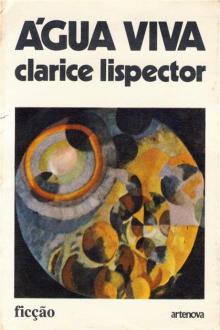 The Stream of Life
The Stream of Life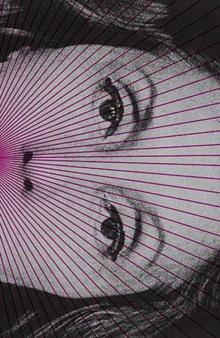 The Complete Stories
The Complete Stories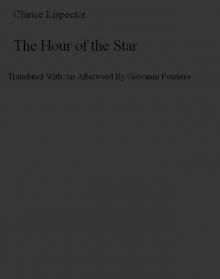 The Hour of the Star
The Hour of the Star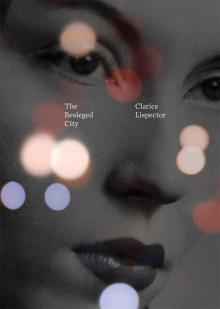 The Besieged City
The Besieged City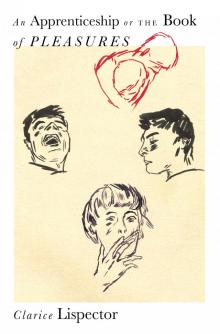 An Apprenticeship or the Book of Pleasures
An Apprenticeship or the Book of Pleasures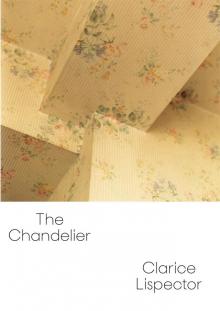 The Chandelier
The Chandelier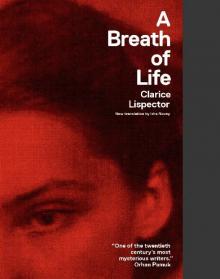 A Breath of Life
A Breath of Life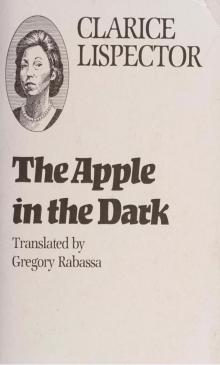 The Apple in the Dark
The Apple in the Dark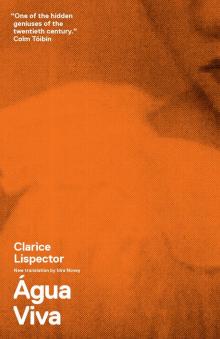 Agua Viva
Agua Viva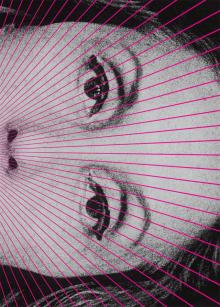 Complete Stories
Complete Stories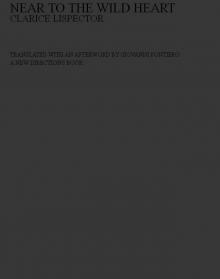 Near to the Wild Heart
Near to the Wild Heart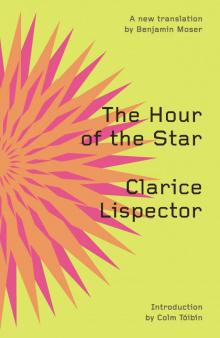 The Hour of the Star ()
The Hour of the Star ()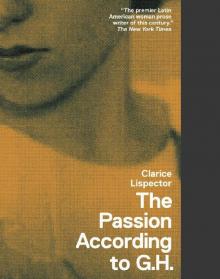 The Passion According to G.H.
The Passion According to G.H.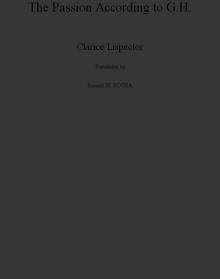 The Passion According to GH
The Passion According to GH